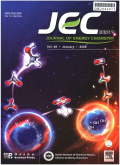- 钛学术文献服务平台 \
- 学术期刊 \
- 工业技术期刊 \
- 石油与天然气工业期刊 \
- 能源化学期刊 \
null
Structural evolution of carbon aerogel microspheres by thermal treatment for high-power supercapacitors
基本信息来源于合作网站,原文需代理用户跳转至来源网站获取
摘要:
In this work,a series of carbon aerogel microspheres (CAMs) with tailored pore structures were successfully prepared via a sol-gel method and subsequent heat-treatment at various temperatures from 600 to 1600 ℃.The effects of heat-treatment temperature (HTT) on the CAM microstructure were systematically investigated by physical and chemical characterization.The electrical conductivity increased by up to 250 S/cm and mesopores with high electrolyte accessibility developed in the CAM with increasing HTT.However,the specific surface area (SSA) decreased for HFTs from 1000 to 1600 ℃.The results show that these two factors should be finely balanced for further applications in high power supercapacitors.The CAMs carbonized at 1000 ℃ had the highest SSA (1454 m2/g),large mesoporous content (20%) and favorable conductivity (71 S/cm).They delivered a high energy density of 38.4Wh/kg at a power density of 0.17 kW/kg.They retained an energy density of 25.5 Wh/kg even at a high power density of 10.2 kW/kg,and a good rate capability of 84% after 10,000 cycles.This performance is superior to,or at least comparable to,those of most reported carbon materials.

推荐文章
期刊_丙丁烷TDLAS测量系统的吸收峰自动检测
带间级联激光器
调谐半导体激光吸收光谱
雾剂检漏 中红外吸收峰 洛伦兹光谱线型
不同盐度、温度及光照对漂浮浒苔生理生态的影响
浒苔
盐度
温度
光照
生理生态
期刊_联合空间信息的改进低秩稀疏矩阵分解的高光谱异常目标检测
高光谱图像
异常目标检测 低秩稀疏矩阵分解 稀疏矩阵 残差矩阵
内容分析
关键词云
关键词热度
相关文献总数
(/次)
(/年)
引文网络
引文网络
二级参考文献 (0)
共引文献 (0)
参考文献 (2)
节点文献
引证文献 (0)
同被引文献 (0)
二级引证文献 (0)
2004(1)
- 参考文献(1)
- 二级参考文献(0)
2015(1)
- 参考文献(1)
- 二级参考文献(0)
2018(0)
- 参考文献(0)
- 二级参考文献(0)
- 引证文献(0)
- 二级引证文献(0)
引文网络交叉学科
相关学者/机构
期刊影响力
能源化学
主办单位:
中国科学院大连化学物理研究所
中国科学院成都有机化学研究所
出版周期:
双月刊
ISSN:
2095-4956
CN:
10-1287/O6
开本:
出版地:
大连市中山路457号
邮发代号:
创刊时间:
语种:
eng
出版文献量(篇)
2804
总下载数(次)
0
期刊文献
相关文献
推荐文献
- 期刊分类
- 期刊(年)
- 期刊(期)
- 期刊推荐
一般工业技术
交通运输
军事科技
冶金工业
动力工程
化学工业
原子能技术
大学学报
建筑科学
无线电电子学与电信技术
机械与仪表工业
水利工程
环境科学与安全科学
电工技术
石油与天然气工业
矿业工程
自动化技术与计算机技术
航空航天
轻工业与手工业
金属学与金属工艺
能源化学2022
能源化学2021
能源化学2020
能源化学2019
能源化学2018
能源化学2017
能源化学2016
能源化学2015
能源化学2014
能源化学2013
能源化学2012
能源化学2011
能源化学2010
能源化学2009
能源化学2008
能源化学2007
能源化学2006
能源化学2005
能源化学2004
能源化学2003
能源化学2002
能源化学2001

 免费查重
免费查重










